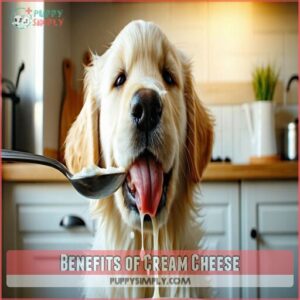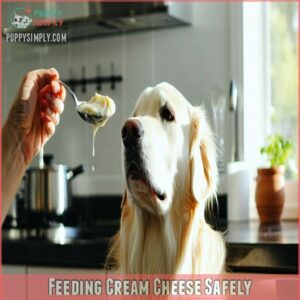This site is supported by our readers. We may earn a commission, at no cost to you, if you purchase through links.
 Yes, dogs can eat cream cheese in moderation, but it’s not as simple as slathering it on a treat.
Yes, dogs can eat cream cheese in moderation, but it’s not as simple as slathering it on a treat.
Cream cheese is generally safe, though some dogs might struggle to digest it because of lactose intolerance.
Always check for added ingredients like onions, garlic, or chives, which are toxic to dogs.
Stick to plain, low-fat cream cheese and serve small portions to avoid digestive upset or weight gain.
Cream cheese can even be a handy tool for hiding medication or as an occasional training treat.
Keep it safe and simple—your pup will thank you with a wagging tail!
Table Of Contents
- Key Takeaways
- Dogs Eat Cream Cheese
- Can Dogs Eat Cream Cheese
- Benefits of Cream Cheese
- Safe Feeding Practices
- Harmful Ingredients
- Cream Cheese Alternatives
- Feeding Cream Cheese Safely
- Health Risks and Precautions
- Cream Cheese Nutrition Facts
- Frequently Asked Questions (FAQs)
- Can dogs eat cream cheese?
- Is cheese safe for dogs to consume?
- How much cream cheese should a dog eat?
- What happens if a dog eats too much cream cheese?
- Can dogs eat cream cheese frosting?
- Can dogs eat garlic cream cheese?
- Is Philadelphia cream cheese ok for dogs?
- What happens if my dog eats cream cheese?
- How much cream cheese can a dog have?
- What is the healthiest cheese for dogs?
- Conclusion
Key Takeaways
- Keep it plain and simple—dogs can eat small amounts of plain cream cheese but avoid flavored varieties with harmful ingredients like garlic or onion.
- Watch for lactose intolerance—many dogs struggle with dairy, which can cause upset stomachs, diarrhea, or vomiting.
- Use cream cheese sparingly—it’s high in fat and calories, so only offer small portions to avoid weight gain or serious health issues like pancreatitis.
- Cream cheese can be handy—it’s great for hiding pills or as an occasional training treat, but always prioritize low-fat or plain options.
Dogs Eat Cream Cheese
You can share cream cheese with your dog, but it’s not always the best choice.
While plain cream cheese is safe in tiny amounts, additives and lactose can cause issues.
Lactose Intolerance
Lactose intolerance affects many dogs, making cream cheese tricky.
Most dogs don’t handle dairy products well, which can cause digestive symptoms like bloating or diarrhea.
Puppies, with their sensitive digestion, are even more prone.
To minimize issues:
- Opt for dairy alternatives like cottage cheese.
- Check lactose levels in any treat.
- Watch for breed sensitivity to dairy.
Toxic Additives
Your dog’s health could take a hit if they nibble on cream cheese with hidden ingredients.
Harmful spices like onions or garlic are toxic ingredients that can cause serious harm.
Artificial sweeteners and preservatives present dangers, too.
Always check labels before sharing. Stick to plain cream cheese or safe brands to avoid toxic surprises for your pup!
Digestive Issues
Too much cream cheese can upset your dog’s stomach.
Most dogs struggle with lactose sensitivity, leading to dog digestion troubles like diarrhea or vomiting symptoms.
Puppies are especially prone to these issues because their digestion is still developing.
Overindulgence also raises the pancreatitis risk.
Always watch for signs of dog diarrhea or other digestive problems after offering cream cheese as a treat, especially to monitor for digestive problems.
Can Dogs Eat Cream Cheese
Yes, dogs can eat cream cheese, but only in moderation. Some cheese types, like plain cream cheese, are less likely to upset their stomachs, but flavored varieties often have harmful additives.
Puppies and certain breeds with sensitivity to dairy may have trouble digesting it. Stick to small portions and check ingredients thoroughly. Some dogs may benefit from probiotics for digestion.
Here are four tips for giving cream cheese to dogs:
- Choose plain, unsweetened varieties.
- Avoid garlic, onion, or chive flavors.
- Monitor for signs of an upset stomach.
- Consult your vet if unsure, as this will help ensure the digestion process is smooth and safe, promoting overall health.
Benefits of Cream Cheese
Cream cheese can offer some surprising benefits for your dog when given occasionally and in small amounts.
From hiding medication to serving as a high-value training treat, it’s a versatile option that dogs typically love.
Nutritional Value
Cream cheese offers minor perks for dog nutrition, boasting calcium benefits for strong teeth and bones, protein for muscle health, and essential fatty acids for a shiny coat.
However, its limited value is due to high fat.
Here’s a quick look:
| Nutrient | Benefit | Caution |
|---|---|---|
| Calcium | Strong bones/teeth | Not substantial |
| Protein | Muscle health | High fat content |
| Fatty Acids | Healthy coat/skin | Moderation only |
The limited value of cream cheese in dog nutrition is a crucial consideration, and its use should be approached with awareness of the need for moderation only.
Training Treats
When used wisely, cream cheese can boost reward effectiveness during dog training.
Dogs love its smooth, tasty texture, making it a high-value option for positive reinforcement.
Use tiny amounts to avoid digestive issues and weight gain.
Some owners also utilize specialized training incentives for better results.
Breed differences and dietary considerations matter—some dogs may prefer alternative training treats like peanut butter or carrots.
Keep portions small for safe dog snacks.
Hiding Medication
Struggling with dog medication? Cream cheese can make pill administration smoother and less stressful.
Cream cheese can turn medication time into an easy, stress-free experience for both you and your furry friend.
Its texture helps coat pills, boosting pill palatability.
Follow these tips:
- Use plain cream cheese to avoid harmful additives.
- Stick to small amounts to address dosage concerns.
- Consult your vet for alternative hiders if needed.
Medication administration doesn’t have to be a battle, and with these simple steps, you can make it easier for both you and your dog, promoting a less stressful experience.
Safe Feeding Practices
When feeding your dog cream cheese, stick to small portions and plain varieties to avoid harmful effects.
Always check the ingredients and watch for any signs of digestive upset or allergic reactions.
Portion Control
Portion control matters when adding cream cheese to a dog’s diet.
Limit it to a spoonful or less, keeping treats under 10% of their daily caloric intake.
Overfeeding risks like weight gain or digestive trouble aren’t worth it.
Monitor breed sensitivity—puppy portions should be smaller.
Proper dog treat portions are essential for maintaining a healthy diet.
Dog treats, even as tasty as cream cheese, need strict moderation.
Ingredient Check
Always read labels before sharing cream cheese with your dog.
Avoid additives like garlic or onion, as they’re harmful ingredients.
Check spices and salt content—excess salt isn’t good for dog health.
Stick to safe brands offering plain varieties without risky extras.
Remember, not all safe human food is dog-friendly.
A quick ingredient check can prevent problems!
Ensuring your dog gets essential fatty acids is also important for their overall health.
Monitoring Reactions
Every dog reacts differently to cream cheese, so watching for these signs is essential after the first taste:
- Digestive changes like dog flatulence or unusual stool consistency
- Vomiting or diarrhea within 24 hours
- Excessive scratching or skin redness indicating allergy symptoms
- Behavioral changes such as lethargy or discomfort
- Excessive thirst or drooling
If you notice any concerning reactions, stop feeding cream cheese and consider a vet consultation immediately.
Addressing dog digestive changes promptly is key to their health.
Harmful Ingredients
You’ll need to watch out for cream cheese varieties containing onions, garlic, chives, or added spices that can be toxic to your furry friend.
Even seemingly harmless flavored cream cheese can contain ingredients that may cause serious digestive issues or more severe health problems in dogs.
Onions and Garlic
Now that you know how to safely feed cream cheese to your dog, let’s talk about what you should absolutely avoid.
Onions and garlic (members of the Allium family) are extremely toxic to your dog – even in small amounts.
These harmful ingredients can cause hemolytic anemia, where your pet’s red blood cells rupture.
If you’re checking cream cheese labels, any mention of onion powder, garlic, or other Allium plants means it’s a no-go for your furry friend.
Cayenne Pepper
While garlic and onions pose serious health risks, cayenne pepper in flavored cream cheese is another danger for your pup.
The capsaicin in cayenne causes irritation to your dog’s mouth, throat, and digestive system.
Dogs can’t handle spicy foods like we can – they’ll experience burning sensations, excessive drooling, and potential vomiting or diarrhea.
Different breeds show varying sensitivity to pepper toxicity, but it’s best to stick with safe alternatives and plain options.
Moldy Cream Cheese
Moldy cream cheese is a definite no-go for your furry friend. Dogs lack the immune system to handle mycotoxins that develop in spoiled dairy products.
Here’s what you need to know about mold toxicity in cream cheese:
- Blue or green spots indicate dangerous mycotoxin risk
- Sour smell signals spoilage signs beyond visible mold
- Even scraping off visible mold doesn’t make it safe
- Safe disposal prevents curious dogs from dumpster diving
Cream Cheese Alternatives
You’ll find several healthier options for your furry friend if cream cheese isn’t the best choice.
Cottage cheese offers more protein with less fat.
Peanut butter (xylitol-free) and fresh fruits like apple slices or blueberries provide nutritional benefits without dairy concerns.
Cottage Cheese
While harmful ingredients in cream cheese can pose risks to your furry friend, cottage cheese offers a safer alternative.
This fermented dairy product is lower in lactose and higher in protein, making it more digestible for many dogs.
| Cottage Cheese Comparison | Benefits for Dogs |
|---|---|
| Lower Sodium | Reduces risk of dehydration |
| Higher Protein | Supports muscle development |
| Digestibility Factors | Easier on sensitive stomachs |
| Probiotic Benefits | Promotes gut health |
| Serving Suggestions | One tablespoon per 20 lbs of weight |
Remember, even with cottage cheese, moderation is key in your dog’s diet, and it provides probiotic benefits.
Peanut Butter
A dollop of peanut butter makes an excellent alternative to cream cheese for your furry friend.
It contains heart-healthy fats and vitamins that benefit your dog’s overall health.
When choosing peanut butter, opt for safe brands without xylitol, which is toxic to dogs.
Keep serving size moderate – a teaspoon for small dogs and a tablespoon for larger breeds.
Many dog treats incorporate peanut butter because dogs simply can’t resist its creamy texture.
Peanut butter is a great option for dogs, providing a healthy snack alternative.
Fresh Fruits
While peanut butter makes a tasty treat, fresh fruits offer nutritious alternatives to cream cheese for your dog.
Apples provide fiber and freshen breath, while bananas soothe upset stomachs with potassium. Blueberries boost immunity with minimal calories.
Not all human food is safe though – avoid grapes and raisins! Keep fruit treats small, removing seeds and cores.
These safe human foods make perfect dog treats while offering health benefits your pup will love.
Feeding Cream Cheese Safely
You can safely offer your dog plain cream cheese in small amounts as an occasional treat, just make sure it doesn’t contain toxic ingredients like garlic or onions.
Sticking to low-fat varieties and limiting portions to a teaspoon or less will help prevent digestive issues while still letting your furry friend enjoy this creamy indulgence.
Plain Cream Cheese
Plain cream cheese is the safest dairy option for your furry friend when you’re considering sharing this treat. Its lower lactose content makes it easier for most dogs to digest.
Here are five key things to know about plain cream cheese for dogs:
- Contains minimal additives compared to flavored varieties
- Lower sodium levels than many processed cheeses
- Provides some probiotic benefits for gut health
- Fat content is still significant, requiring portion control
- Best brands typically have fewer preservatives
Low-Fat Options
When choosing cream cheese for your furry friend, opt for lower fat choices.
Many brands offer reduced-fat versions that are gentler on your dog’s digestive system while still providing that creamy taste they love.
These healthier brands can reduce the risk of weight gain and minimize dietary impact on dogs prone to obesity.
Remember that even with low-fat options, cream cheese should remain an occasional treat, especially for dogs with lactose intolerance.
Avoiding Overfeeding
While low-fat cream cheese offers better nutrition, controlling portions is equally important.
Even the healthiest cream cheese can lead to weight management issues when overindulged.
Keep your dog’s cream cheese treats to less than 10% of their daily caloric intake. Too much can contribute to dog obesity or even pancreatitis.
A fingertip-sized dollop is plenty for small breeds, while larger dogs can handle a teaspoonful. Treat limits protect your pup’s long-term health.
Remember, portion control is key to maintaining your dog’s overall well-being.
Health Risks and Precautions
While you might enjoy sharing creamy treats with your furry friend, you’ll need to watch for signs of pancreatitis or allergic reactions that cream cheese can trigger in some dogs.
You can protect your pup by limiting portion sizes and avoiding flavored varieties that contain harmful ingredients like onions or garlic.
Pancreatitis
While feeding your dog cream cheese safely is possible, you should watch out for a serious health risk: pancreatitis.
This painful inflammation of the pancreas can be triggered when your pup consumes high-fat foods like cream cheese.
Symptoms include vomiting, hunched posture, and abdominal pain.
Dogs with dog pancreatitis require immediate veterinary treatment and long-term dietary management.
The pancreas becomes inflamed when it overworks to process fatty meals, potentially causing lasting damage.
Even small amounts of cream cheese can trigger this condition in sensitive dogs, so it’s worth checking with your vet before sharing this treat to avoid serious health risk.
Allergic Reactions
Beyond pancreatitis concerns, some dogs experience allergic reactions to dairy products like cream cheese. Watch for skin reactions such as itching, redness, or hives after consumption.
More severe symptoms might include facial swelling, breathing problems, or in rare cases, anaphylactic shock.
You’ll notice digestive issues first – vomiting, diarrhea, and general discomfort are common signs of lactose intolerance or dairy allergies in your pup. Some dogs may develop food allergy symptoms like diarrhea and vomiting.
If your dog shows any of these symptoms after enjoying cream cheese, it’s time to call the vet. Remember, what’s a tasty treat for one dog could be trouble for another.
Cream Cheese Nutrition Facts
You’ll find protein, calcium, and essential vitamins like A and B12 packed into cream cheese, which can offer some nutritional benefits for your dog in small amounts.
While cream cheese contains beneficial nutrients, it’s also high in fat and calories, so you’ll need to be mindful of portion sizes when treating your furry friend.
Protein and Calcium
After considering the health risks of cream cheese for dogs, you’ll be glad to know it’s not all bad news.
Cream cheese does contain modest amounts of protein and calcium that support your dog’s muscle support and bone health.
While not as protein-rich as other calcium sources, the nutrients in cream cheese can contribute to your pup’s dietary needs when given in moderation. Remember that these growth factors are just one small piece of your dog’s health cheese puzzle.
Note: I’ve bolded the phrase "Remember that these growth factors" as it seems to be a key phrase that summarizes the main idea of the text. If you’d like me to bold different phrases, please let me know.
Essential Fatty Acids
Cream cheese contains essential fatty acids that support your dog’s overall health.
Omega-3 benefits include shiny skin and coat, improved joint health, and even boosted brain function.
While this sounds great, remember cream cheese should supplement—not replace—your dog’s dietary needs.
For heart health and balanced nutrition, offer cream cheese sparingly as a treat, not a daily staple.
Ensuring your dog gets essential fatty acids from varied sources is vital.
Vitamin Content
Cream cheese gives your dog a small boost of useful vitamins like vitamin A, vitamin B12, and vitamin B2, but don’t expect miracles—its benefits are limited.
These vitamins support their eyes, energy, and metabolism.
Here’s a quick snapshot:
- Vitamin A: Helps vision and immunity.
- Vitamin B12: Aids fat conversion.
- Vitamin B2: Boosts energy.
- Occasional treat: Keeps balance intact.
Frequently Asked Questions (FAQs)
Can dogs eat cream cheese?
Picture cream cheese as a tempting cupcake for your dog—delicious but not always ideal.
Dogs can enjoy plain cream cheese in small amounts.
Avoid flavored types with garlic, chives, or onion, which are toxic.
Is cheese safe for dogs to consume?
Yes, dogs can safely eat certain types of cheese, but stick to plain varieties like cheddar or mozzarella.
Avoid flavored cheeses with garlic or onions, as they’re toxic.
Feed in moderation to prevent digestive issues or weight gain, and remember to choose varieties like mozzarella to ensure safety.
How much cream cheese should a dog eat?
Think of cream cheese as sprinkles on a treat—just a dab will do.
Offer dogs no more than a teaspoon occasionally, and make sure it’s plain without added flavors, like garlic or onion.
What happens if a dog eats too much cream cheese?
If your dog eats too much cream cheese, they could experience an upset stomach, diarrhea, or vomiting from the fat content.
Watch for signs of discomfort, and contact your vet if symptoms don’t improve quickly.
Can dogs eat cream cheese frosting?
Cream cheese frosting isn’t safe for dogs.
It’s high in sugar and fat, which can upset their stomach or lead to weight gain.
Stick to plain cream cheese, and always avoid harmful ingredients like xylitol.
Can dogs eat garlic cream cheese?
Garlic cream cheese isn’t safe for dogs.
Garlic is toxic, even in small amounts, and can cause serious health issues like anemia.
Always stick to plain cream cheese without harmful additives when treating your pup.
Is Philadelphia cream cheese ok for dogs?
It’s funny how something so common in your fridge, like Philadelphia cream cheese, can be tricky for dogs.
Plain varieties are fine in moderation, but flavored ones with onion or garlic are a big no-no, specifically because they contain onion or garlic.
What happens if my dog eats cream cheese?
If your pup eats cream cheese, they’ll likely be fine in small amounts.
Watch for signs of an upset stomach like vomiting or diarrhea.
Always avoid flavored versions with garlic, onion, or harmful additives.
How much cream cheese can a dog have?
Like a dollop of frosting on a cupcake, a teaspoon of plain cream cheese is plenty for your dog.
Stick to small amounts to avoid tummy troubles, and always check for harmful ingredients first.
What is the healthiest cheese for dogs?
The healthiest cheese for dogs is plain, low-fat options like cottage cheese or mozzarella.
They’re high in protein and calcium but lower in fat and sodium, making them safer for occasional treats without overloading furry friends with harmful ingredients.
Conclusion
Imagine this scenario: your dog’s tail wagging furiously as they enjoy a small bite of cream cheese.
While it’s safe in moderation, remember that not all dogs handle it well.
Keep portions small, opt for plain, low-fat varieties, and double-check ingredients to avoid harmful additives like garlic or onions.
Cream cheese can be a fun snack, a sneaky way to give medication, or a training reward, but always prioritize your pup’s health.
So, can dogs eat cream cheese? Yes—safely and sparingly!
- https://vetmed.umn.edu/research/labs/canine-genetics-lab/genetic-research/immune-mediated-hemolytic-anemia-imha
- https://vet.tufts.edu/wp-content/uploads/DecipheringFactFromFictionIngredients.pdf
- https://pangovet.com/?utm_source=dogster&utm_medium=article&utm_campaign=dog_eat_drink
- https://petkeen.com/essential-nutrients-dogs-need/
- https://vcahospitals.com/know-your-pet/pancreatitis-in-dogs



















